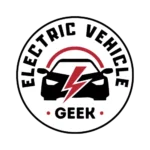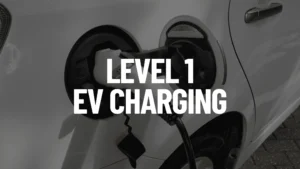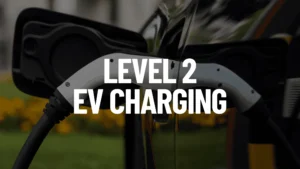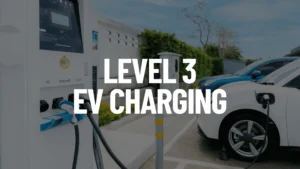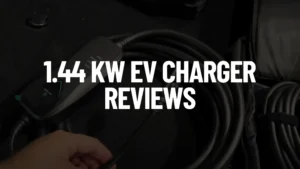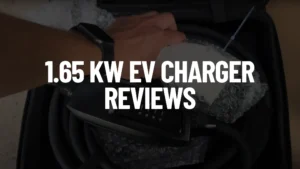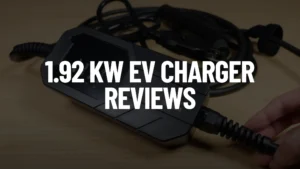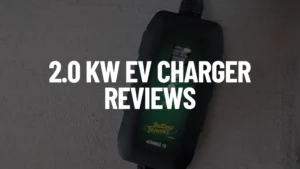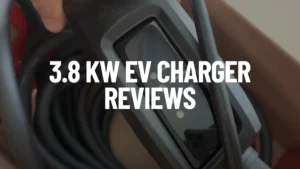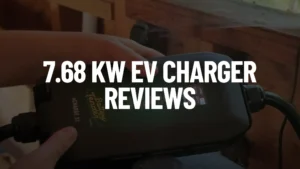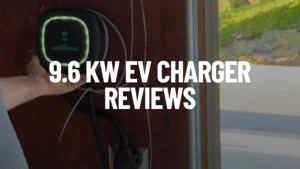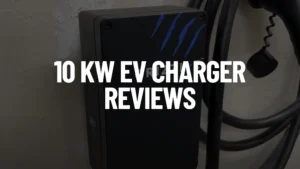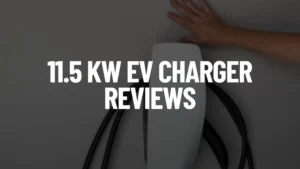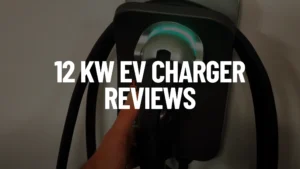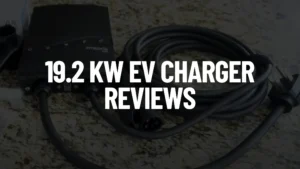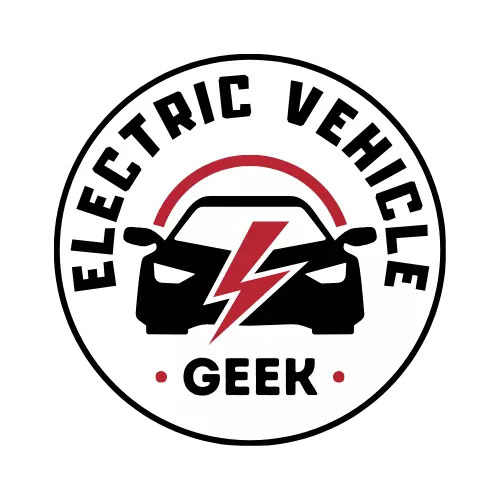Supported by you via insider access, and when you purchase through links on our site, we may earn an affiliate commission. See our Affiliate Disclosure.
EV Charger kW Ratings & Reviews
-
 James Ndungu
James Ndungu
- Last Updated October 26, 2025
An EV charger’s kilowatt (kW) rating is a measure of its electrical power demand, the amount of electricity it can deliver to the vehicle’s battery at any given moment, regardless of how long it operates. A higher kW rating means the charger can transfer more electricity per second, resulting in faster charging speeds.
kW vs. kWh
Although closely related, kW and kWh measure different aspects of EV charging. kW refers to the charger’s power output at a given moment, while kWh measures the total energy delivered over time, an important distinction when planning charging needs or managing EV charging costs.
For example, the Tesla Wall Connector has a maximum power output of 11.5 kW, which shows how fast it can deliver energy to a vehicle’s battery at any moment. In contrast, the Tesla Model Y battery stores 75 kWh, representing the total amount of energy the battery can hold. This illustrates the difference between kW (charging speed) and kWh (total energy capacity).
Estimating EV Charging Time Using kW and kWh
Understanding the relationship between kW (charger power) and kWh (battery capacity) is essential when selecting the right EV charger. It allows you to estimate how long it will take to charge your EV based on your battery size and the charger’s output.
The formula is simple:
Charging Time (hours) = Battery Capacity (kWh) ÷ Charger Power (kW)
Example:
For a Tesla Model Y with a 75 kWh battery and a Tesla Wall Connector rated at 11.5 kW, the estimated charging time is:
Time = 75 kWh ÷ 11.5 kW ≈ 6.5 hours
This shows it will take the Tesla Wall Connector, rated at 11.5 kW, approximately 6.5 hours to fully charge a Tesla Model Y with a 75 kWh battery.
If you want to reduce charging time, you would need a higher-19.2 kW power EV charger, such as the Grizzl-E Ultimate Level 2 Fastest 80A / 19.2 kW charger, which can fully charge the same battery in about 3.9 hours.
Time = 75 kWh ÷ 19.2 kW ≈ 3.9 hours
Types of EV Chargers by kW Rating
EV chargers are categorized into levels based on their power output, which directly determines charging speed and typical use cases. Power ratings range from slow home 120V charging (around 3 kW) to faster 240V AC charging (3.3 kW to 22 kW), and ultra-fast DC charging (50 kW, 150 kW, 350 kW, and even 600 kW or more).
Output Power Range
1.4 to 2.4 kW
Voltage
120 V
Estimated Charge Time
20-40+ hours for a full charge
Estimated Range Per Hour
3-5 miles
Best Use Case
Slow, overnight trickle charging for daily commutes or plug-in hybrids.
Output Power Range
3.3 to 19.2 kW
Voltage
208-240 V
Estimated Charge Time
4-10 hours for a full charge
Estimated Range Per Hour
10-60 miles
Best Use Case
The standard for daily home, workplace, and public destination charging.
Output Power Range
50 to 350+ kW
Voltage
400+ V
Estimated Charge Time
15-60 minutes to reach 80% charge
Estimated Range Per Hour
180-240+ miles
Best Use Case
Quick top-ups for long-distance travel and commercial fleets.
Choosing the Right Power Output for Your EV Charging Station
Choosing the right EV charger isn’t just about brand or features, matching your EV’s charging acceptance and your home’s electrical setup is essential.
Start by considering your daily driving habits and mileage. The distance you drive each day determines how quickly you need to recharge.
Next, look at your vehicle’s maximum AC charging rate (onboard charger capacity). Charging faster than your car can accept provides no benefit.
Your home’s electrical capacity, including breaker panel amperage, will affect which chargers can be safely installed. Also, consider whether you have single-phase or three-phase power, as certain high-power chargers require three-phase setups.
Budget is another key factor. Higher kW units often require more expensive installation or electrical upgrades.
Finally, think about your desired charging speed and how long you plan to keep your EV plugged in. Availability of off-peak electricity rates can make overnight charging more economical.
Considering these factors helps you select a charger power output that is safe, efficient, and well-suited to your needs.
Below are the most common power levels available on the market:
Entry-level Level 1 chargers for small batteries and overnight home charging.
Voltage
120V
Amperage
12A
Estimated Charging Time
52 hours for a 75 kWh battery
Estimated Range Per Hour
4.3 miles
Slightly faster Level 1 chargers for small EVs and light daily commuting use.
Voltage
120V
Amperage
13.75A
Estimated Charging Time
45 hours for a 75 kWh battery
Estimated Range Per Hour
5 miles
High-output Level 1 chargers for small batteries and overnight top-ups.
Voltage
120V
Amperage
16A
Estimated Charging Time
39 hours for a 75 kWh battery
Estimated Range Per Hour
5.8 miles
Faster Level 1 chargers or light Level 2 units for short daily trips.
Voltage
120V/240V
Amperage
16.7A
Estimated Charging Time
37.5 hours for a 75 kWh battery
Estimated Range Per Hour:
6 miles
Low-end Level 2 chargers for typical home charging of medium batteries.
Voltage
240V
Amperage
15.8A
Estimated Charging Time
19.7 hours for a 75 kWh battery
Estimated Range Per Hour
11.4 miles
Mid-range Level 2 chargers for home use with faster overnight charging.
Voltage
240V
Amperage
32A
Estimated Charging Time
9.7 hours for a 75 kWh battery
Estimated Range Per Hour
23 miles
Higher-power Level 2 chargers for larger batteries or multiple daily users.
Voltage
240V
Amperage
40A
Estimated Charging Time
7.8 hours for a 75 kWh battery
Estimated Range Per Hour
28.8 miles
Balanced Level 2 chargers offering faster charging without stressing home panels.
Voltage
240V
Amperage
41.6A
Estimated Charging Time
7.5 hours for a 75 kWh battery
Estimated Range Per Hour
30 miles
Standard 48 A Level 2 chargers for home or small commercial installations.
Voltage
240V
Amperage
48A
Estimated Charging Time
6.5 hours for a 75 kWh battery
Estimated Range Per Hour
34.5 miles
High-output Level 2 chargers for EVs with large batteries at home or work.
Voltage
240V
Amperage
50A
Estimated Charging Time
6.25 hours for a 75 kWh battery
Estimated Range Per Hour
36 miles
Max-power Level 2 chargers for residential or commercial fast AC charging.
Voltage
240V
Amperage
80A
Estimated Charging Time
3.9 hours for a 75 kWh battery
Estimated Range Per Hour
57.6 miles
Page Note: Approximate values throughout this post are based on charging a typical 60–80 kWh EV battery from near empty. Instead of relying on manufacturer-specified power ratings, we tested each charger using the Fluke FEV150 EV Charging Station Analyzer to measure voltage and current, then manually calculated the power using the formula P = V × I. Actual charge times and range per hour may still vary depending on battery size, onboard charging capability, state of charge, driving habits, climate, and the specific vehicle model.
Get a Personalized Electric Vehicle Charger Recommendation
Save up to 20% on your home EV charger by choosing the right kW for your EV and daily driving needs. Get a reliable, future-proof solution that matches your battery size and home setup. Click below for a personalized recommendation and find the best charger power output for your vehicle and home.
James Ndungu is a certified EV charger installer with over five years of experience in EVSE selection, permitting, and installation. He holds advanced credentials, including certification from the Electric Vehicle Infrastructure Training Program (EVITP) and specialized training in EV charging equipment and installation, as well as diplomas in EV Technology and Engineering Fundamentals of EVs. Since 2021, James has tested dozens of EV chargers and accessories, sharing expert insights into the latest EV charging technologies.
